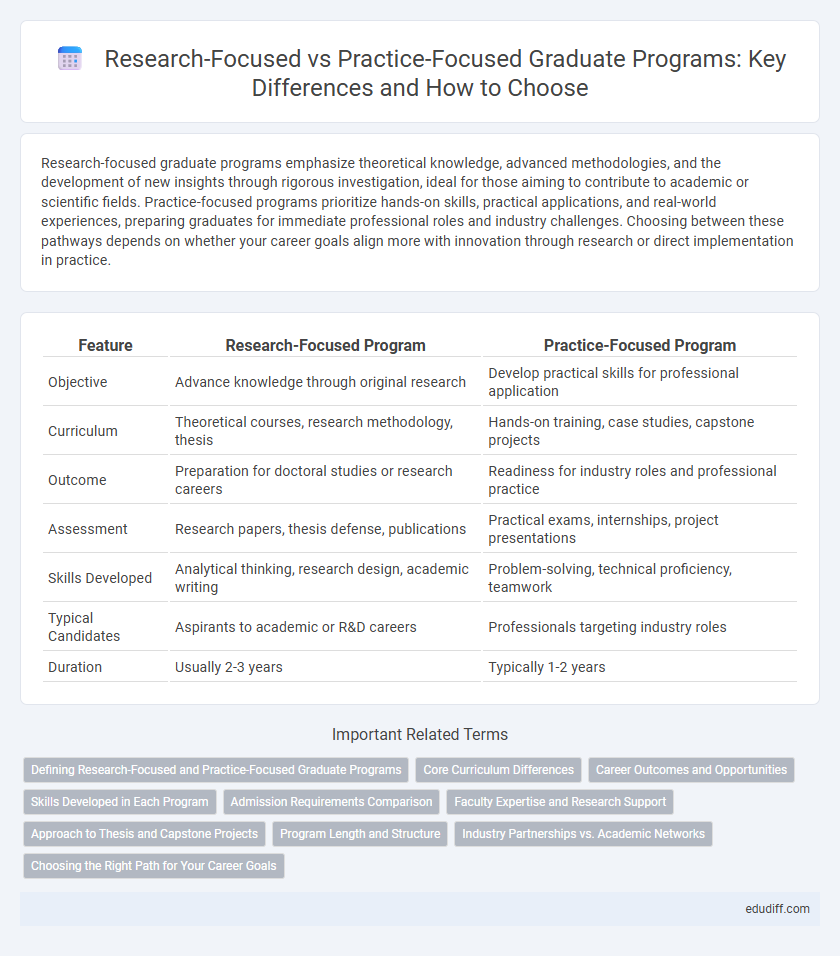Research-focused graduate programs emphasize theoretical knowledge, advanced methodologies, and the development of new insights through rigorous investigation, ideal for those aiming to contribute to academic or scientific fields. Practice-focused programs prioritize hands-on skills, practical applications, and real-world experiences, preparing graduates for immediate professional roles and industry challenges. Choosing between these pathways depends on whether your career goals align more with innovation through research or direct implementation in practice.
Table of Comparison
| Feature | Research-Focused Program | Practice-Focused Program |
|---|---|---|
| Objective | Advance knowledge through original research | Develop practical skills for professional application |
| Curriculum | Theoretical courses, research methodology, thesis | Hands-on training, case studies, capstone projects |
| Outcome | Preparation for doctoral studies or research careers | Readiness for industry roles and professional practice |
| Assessment | Research papers, thesis defense, publications | Practical exams, internships, project presentations |
| Skills Developed | Analytical thinking, research design, academic writing | Problem-solving, technical proficiency, teamwork |
| Typical Candidates | Aspirants to academic or R&D careers | Professionals targeting industry roles |
| Duration | Usually 2-3 years | Typically 1-2 years |
Defining Research-Focused and Practice-Focused Graduate Programs
Research-focused graduate programs emphasize generating new knowledge through rigorous methodologies, including hypothesis formulation, data collection, and analysis. Practice-focused programs prioritize the application of existing theories and skills to real-world professional settings, fostering practical expertise and problem-solving abilities. Both approaches cater to distinct career paths, with research-centric tracks aligning with academia and innovation, while practice-oriented tracks prepare students for industry and specialized professions.
Core Curriculum Differences
Research-focused graduate programs emphasize advanced theoretical frameworks, statistical analysis, and methodological rigor, preparing students for academic or scientific careers. Practice-focused programs prioritize applied skills, practical training, and real-world problem-solving, aligning closely with industry standards and professional certifications. Core curriculum in research-oriented tracks often includes extensive coursework in research design and data interpretation, whereas practice-oriented tracks focus on experiential learning and case-based studies.
Career Outcomes and Opportunities
Research-focused graduate programs emphasize developing advanced analytical and methodological skills, leading to career opportunities in academia, research institutions, and specialized industry roles. Practice-focused programs prioritize applied knowledge and practical skills, preparing graduates for immediate employment in professional settings such as healthcare, education, and business management. Career outcomes vary significantly, with research graduates often pursuing PhDs and research-intensive roles, while practice graduates typically enter industry positions requiring hands-on expertise and professional certifications.
Skills Developed in Each Program
Research-focused graduate programs develop advanced analytical skills, critical thinking, and proficiency in data interpretation, preparing students for academic or scientific careers. Practice-focused programs emphasize hands-on expertise, practical problem-solving, and applied knowledge to equip students for industry-specific roles and immediate professional practice. Both programs cultivate communication skills, but research-focused studies prioritize scholarly writing while practice-focused training hones client interaction and team collaboration.
Admission Requirements Comparison
Research-focused graduate programs typically require a strong academic background with emphasis on previous research experience, high GRE scores, and letters of recommendation highlighting analytical skills and potential for scholarly work. Practice-focused programs prioritize professional experience, relevant certifications, and demonstrated skills in practical applications, often accepting applicants with varying academic records but consistent industry engagement. Both program types may demand personal statements, but research-focused admissions stress research proposals while practice-based programs emphasize career goals and hands-on achievements.
Faculty Expertise and Research Support
Graduate programs with a research-focused curriculum prioritize faculty expertise in pioneering studies and offer extensive research support, including access to laboratories, funding, and publication opportunities. Practice-focused programs emphasize faculty with industry experience who provide practical insights and mentorship tailored to professional applications. The alignment of faculty expertise with research support resources significantly influences the depth of scholarly inquiry and the development of applied skills in graduate education.
Approach to Thesis and Capstone Projects
Research-focused graduate programs emphasize original thesis work aimed at contributing new knowledge to the field, involving rigorous data analysis and theoretical exploration. Practice-focused programs prioritize applied capstone projects designed to solve real-world problems, integrating professional skills and industry standards. Both approaches develop critical thinking, but research-driven theses target academic advancement while practice-based projects focus on practical implementation.
Program Length and Structure
Research-focused graduate programs typically span 2 to 3 years, emphasizing independent research, thesis development, and academic publications. Practice-focused programs usually last 1 to 2 years, concentrating on hands-on skills, internships, and applied projects tailored to professional settings. The structure of research programs centers on coursework paired with extensive research components, while practice programs prioritize experiential learning and practical training modules.
Industry Partnerships vs. Academic Networks
Research-focused graduate programs leverage extensive academic networks to drive innovation, foster interdisciplinary collaboration, and enhance theoretical knowledge through partnerships with leading universities and research institutions. Practice-focused programs emphasize industry partnerships, integrating real-world applications, professional skills, and direct experience with corporations to prepare graduates for immediate workforce demands. The choice between these programs depends on whether students prioritize cutting-edge research opportunities or practical industry engagement.
Choosing the Right Path for Your Career Goals
Graduate choices between research-focused and practice-focused programs hinge on career aspirations; research programs emphasize theory development and academic publishing, ideal for those pursuing doctoral studies or academic careers. Practice-focused programs prioritize skill application and industry readiness, tailored for graduates aiming for immediate roles in professional settings or specialized fields. Assessing long-term goals, desired work environments, and preferred skill sets ensures alignment with program outcomes and enhances career trajectory success.
Research-Focused Program vs Practice-Focused Program Infographic

 edudiff.com
edudiff.com